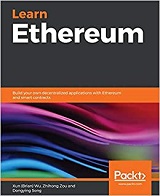
|
FreeComputerBooks.com
Links to Free Computer, Mathematics, Technical Books all over the World
|
|
- Title Learn Ethereum: Build your own Decentralized Applications with Ethereum and Smart Contracts
- Author(s) Xun (Brian) Wu, Zhihong Zou, Dongying Song
- Publisher: Packt Publishing (September 20, 2019); eBook (Free Edition)
- Permission: Free eBook by the Publisher (Packt)
- Paperback 540 pages
- eBook HTML
- Language: English
- ISBN-10/ASIN: 1789954118
- ISBN-13: 978-1789954111
- Share This:

|
Ethereum is a blockchain-based, decentralized computing platform that allows running smart contracts. This book provides a basic overview of how Ethereum works, its ecosystem, mining process, and the consensus mechanism. It also demonstrates a step-by-step approach for building decentralized applications.
This book begins with the very basics of Blockchain technology. Then it dives deep into the Ethereum architecture, framework and tools in its ecosystem. It also provides you an overview of ongoing research on Ethereum, for example, Layer 1 and 2 scaling solution, Stablecoin, ICO/STO/IEO, etc.
Next, it explains Solidity language in detail, and provides step-by-step instructions for designing, developing, testing, deploying, and monitoring decentralized applications.
- Explore the Ethereum ecosystem and understand the latest research on the platform
- Build decentralized apps (Dapps) using smart contracts and Ethereum with the help of practical examples
- Learn to make your decentralized applications fast and highly secure
- Bellaj Badr is an experienced security and software engineer who loves blockchain with a passion. Currently, he is the CTO at Mchain, a blockchain start-up that develops blockchain solutions for companies.
- Blockchain, Bitcoin, and Cryptocurrency
- Cryptography, Cryptology, and Cryptanalysis
- Financial Mathematics, Financial Engineering, and Financial Technologies
- Parallel, Concurrent, and Distributed Computing and Programming
- Information Security

- Learn Ethereum: Build your own Decentralized Applications with Ethereum and Smart Contracts
- The Mirror Site (1) - PDF
-
 Mastering Bitcoin, 3rd Edition: Programming the Open Blockchain
Mastering Bitcoin, 3rd Edition: Programming the Open Blockchain
This book is your guide through the seemingly complex world of Bitcoin, providing the knowledge you need to participate in the internet of money, provides essential detail to get you started.
-
 Mastering Ethereum: Building Smart Contracts and DApps
Mastering Ethereum: Building Smart Contracts and DApps
The book is intended to serve both as a reference manual and as a cover-to-cover exploration of Ethereum. If you're looking to get started with the Ethereum protocol (open source developers, integrators, etc.), this is the definitive book on the topic.
-
 Everything You Want To Know About Bitcoin But Are Afraid To Ask
Everything You Want To Know About Bitcoin But Are Afraid To Ask
Discover the intriguing world of Bitcoin with his comprehensive guide is your reliable navigator through the labyrinth of Bitcoin, perfect for eager novices and seasoned investors alike.
-
 Blockchain and Crypto Currency: Marketplace for Crypto Data
Blockchain and Crypto Currency: Marketplace for Crypto Data
This book contributes to the creation of a cyber ecosystem supported by Blockchain technology in which technology and people can coexist in harmony. The decentralization of the recording process is expected to significantly economize the cost of transactions.
-
 Blockchain for Developers and Technology Enthusiasts
Blockchain for Developers and Technology Enthusiasts
This book is a basic guide for anyone who wishes to start with Blockchain technology. It tries to organize the topics in a way that both developers and technology enthusiasts can go through it and understand the topics without any effort.
-
 Mastering the Lightning Network: A Second Layer Blockchain
Mastering the Lightning Network: A Second Layer Blockchain
Ideal for developers, systems architects, investors, and entrepreneurs looking to gain a better understanding of Lightning Network (LN), this book demonstrates why experts consider LN a critical solution to Bitcoin's scalability problem.
-
 Blockchain for Dummies, IBM Limited Edition (Manav Gupta)
Blockchain for Dummies, IBM Limited Edition (Manav Gupta)
This book equips you with an understanding of what Blockchain is, how it works, and how it can enhance your business and the industry in which it operates - the fundamentals of blockchain and how it revolutionizes transactions and business networks.
-
 Getting Started with Enterprise Blockchain (Michael Bradley, et al.)
Getting Started with Enterprise Blockchain (Michael Bradley, et al.)
This ebook explains how developers can establish a blockchain network to handle business-to-business transactions while maintaining privacy and confidentiality, and how to start using these open, distributed ledgers to add value to your business networks.
-
 Blockchain By Example (Bellaj Badr, et al)
Blockchain By Example (Bellaj Badr, et al)
This book will walk you through the process of building multiple Blockchain projects with different complexity levels and hurdles. Each project will teach you just enough about the field's leading technologies, Bitcoin, Ethereum, Quorum, and Hyperledger, etc.
-
 Grokking Bitcoin (Kalle Rosenbaum)
Grokking Bitcoin (Kalle Rosenbaum)
You'll finally understand how Bitcoin works, how you can use it, and why you can trust the blockchain. You'll discover how Bitcoin mining works, how to accept Bitcoin, how to participate in the Bitcoin network, and how to set up a digital wallet.
-
 Bitcoin and Beyond (Malcolm Campbell-Verduyn)
Bitcoin and Beyond (Malcolm Campbell-Verduyn)
This book brings scholars of anthropology, economics, Science and Technology Studies, and sociology together with GPE scholars in assessing the actual implications posed by Bitcoin and blockchains for contemporary global governance.
-
 Bitcoin and Cryptocurrency Technologies (Arvind Narayanan, ...)
Bitcoin and Cryptocurrency Technologies (Arvind Narayanan, ...)
It provides a comprehensive introduction to the revolutionary yet often misunderstood new technologies of digital currency. This authoritative and self-contained book tells you everything you need to know about the new global money for the Internet age.





